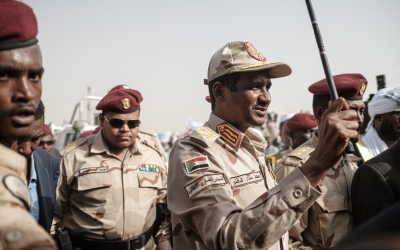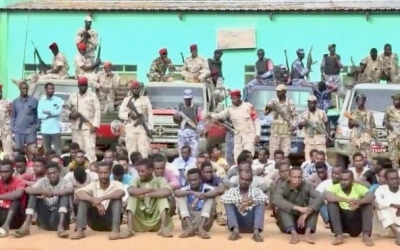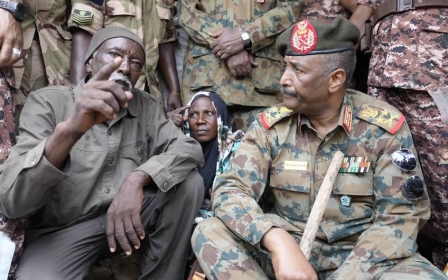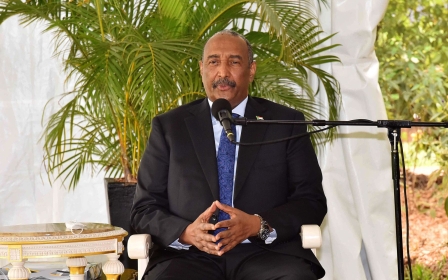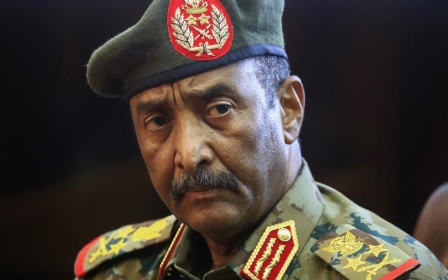Libya: Sudanese rebels 'agree to withdraw' from country and return home
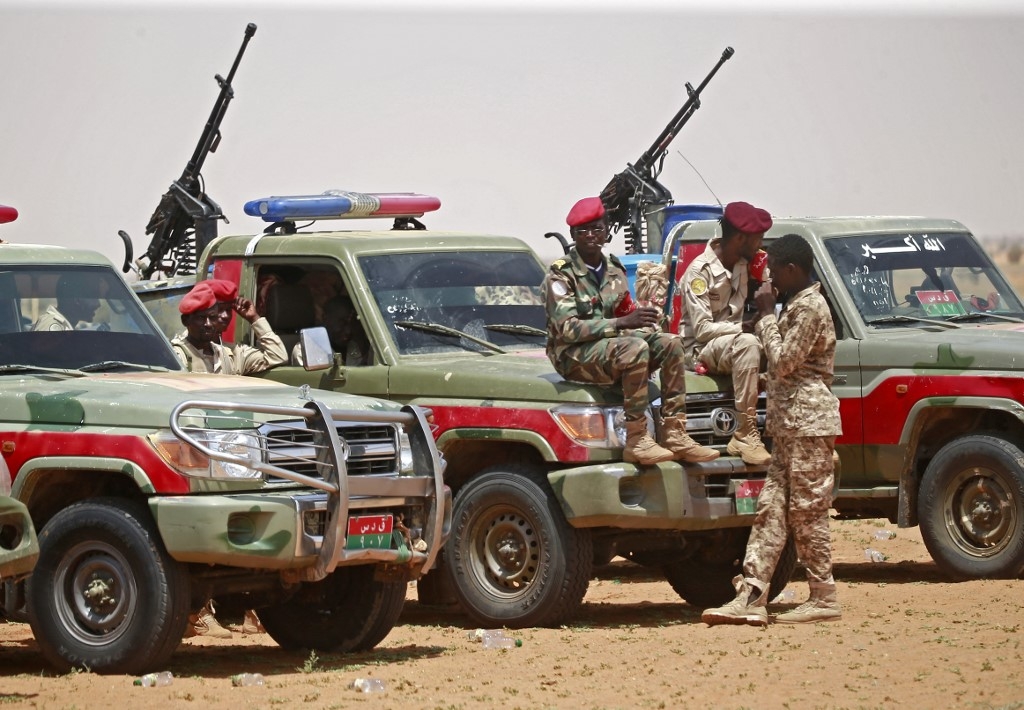
Seven Sudanese rebel groups, including former Janjaweed forces, agreed to withdraw their forces from Libya at a meeting earlier this month.
The meeting, held in the Niger capital of Niamey between 10 and 12 June, was convened by the French organisation Promediation and attended by international and regional envoys, including representatives from the UN, the US, the EU, Norway, Turkey, and Egypt.
'We have been forced to go to Libya for many security reasons and we have to return to our country and let the Libyans build their country as they want'
- Ismail al-Agbash, Awakening Revolutionary Council
They also discussed practical ways to disarm the rebel groups and how they might be reintegrated into the national army.
The forces, internationally regarded as mercenaries, are made up of around 30,000 men who have been fighting alongside the Libyan military commander Khalifa Haftar, longtime leader of the Libyan National Army (LNA), and are based in the east of the country.
June’s meeting was the second to discuss Sudanese armed groups in Libya as part of a broader push by regional and international powers to withdraw all mercenaries.
New MEE newsletter: Jerusalem Dispatch
Sign up to get the latest insights and analysis on Israel-Palestine, alongside Turkey Unpacked and other MEE newsletters
Another meeting was held in February and attended by the rebels and representatives from the governments of Sudan, Chad, Niger, and Libya, according to rebel sources.
A leading member of the New Justice and Equality Movement (NJEM), which has broken away from the Justice and Equality Movement (JEM) led by the Sudanese finance minister, Gibril Ibrahim, told Middle East Eye that the meeting had been attended by seven rebel groups who are not part of the Juba peace agreement.
Other groups who broke away from the Sudan Liberation Movement, as well as the Sudanese Awakening Revolutionary Council and the government of Sudan, were represented by the head of military intelligence in the meeting, he said.
“We all know that the international powers want to end the presence of fighters in Libya from countries outside our region, including from Turkey and others, and most importantly the Russian Wagner group,” said the source, who asked not to be named as he was not authorised to talk to the media.
Terrorism and weapons smuggling
Also discussed at the meeting were how to tackle terrorism in the region, illegal migration from Africa to Europe, and the smuggling of weapons and drugs, alongside how international powers would pay to remove foreign forces from Libya and return them to their countries.
Mohamed Badawi, a researcher at the African Centre for Justice and Peace Studies in Sudan, said that the international powers - and France in particular - were concerned about the entire sub-Saharan region, especially with the increasing influence of Russia in Libya and the region in general.
But Badawi also told MEE that the withdrawal of foreign forces from Libya was not the only factor that could help stabilise the region.
“I think the western powers headed by France are only aiming at ending the Russian influence in the region, so they will be pressuring the rebels and governments in the region to conclude this process.
"In return for that they need to pay a huge amount of money, as well as monitoring the entire process,” he said.
The plan to remove the rebel forces from Libya and begin the process of returning them to Sudan was confirmed in a statement issued by the seven rebel groups (allied under a new umbrella called the Coalition for Transitional Path), alongside the government of Sudan, and other regional and international monitors.
“The meeting has discussed two main issues, including the withdrawal of the Sudanese fighters from Libya, and the necessary security arrangements for them through the process of disarmament, demobilisation and reintegration, as well as their participation in the transitional path and the peace process in Darfur,” the statement, issued on 11 June in Niamey, read.
The Awakening Revolutionary Council, the former Janjaweed group led by Musa Hilal, was expelled from Darfur after violent clashes with the Sudanese Rapid Support Forces (RSF), led by General Mohamed Hamdan Daglo (also known as Hemeti).
Opposition
A spokesman for the Awakening Revolutionary Council, Ismail al-Agbash, said that the Niamey meeting had faced opposition from the RSF, led by the deputy chairman of Sudan's Sovereign Council, the rebel movements that signed the Juba peace agreement, and the Forces for Freedom and Change (FFC).
He told MEE that some leaders of his group had faced intimidation from the RSF, but insisted that they would go ahead with their plan as it had wide regional and international support.
“We are facing a lot of political pressure and security difficulties, but we will continue with this plan, which got wide external support," he said.
"We are Sudanese and we have the right to be part of this transitional period [in our country]. We have been forced to go to Libya for many security reasons and we have to return to our country and let the Libyans build their country as they want. We are not mercenaries as a lot of people said.
“A lot of sides, including the RSF, the Juba peace agreement powers, and the FFC feel that our return will create a conflict of interest with them, but this is not true. This is why they are putting obstacles in the way."
MEE tried to talk to the RSF and FFC, but received no response.
Acting cautiously
However, a leading member of the Sudanese Revolutionary Front (SRF), which signed the Juba peace deal with the government in October 2020, downplayed the Niamey agreement.
“We appreciate any efforts to stabilise Libya and we support the political transition in Sudan. But the number of fighters in these forces has been overstated in order to get more representation in the Sudanese army after the process is finished," said the SRF source, who asked not to be named as he was not authorised to talk to the media.
“We know that regional and international communities also want to put an end to the presence of foreign forces in Libya, but we have to deal with these issues wisely to avoid any negative impact on the regional countries of those fighters when they return.”
'Some of these forces have a record of human rights violations, whether in Libya or in Sudan, so this issue also has to be addressed fairly'
- Mohamed Badawi, researcher
Badawi at the ACJPS said that the Sudanese component of this international plan may be restricted to disarming these small groups and removing them from Libya.
“However, the attempt to give these groups any kind of political role will create a conflict of interest, because they are mainly breakaway movements from former rebel groups that are currently in Khartoum and participating in the government.
"So, it’s the responsibility of the Sudanese government to act cautiously and have a clear national plan.”
He added that this process did not represent a comprehensive solution to the spread of these small breakaway groups beyond Libya across Sudan, Chad, and Niger.
“These groups that break away from the main ones are also aiming at financing themselves from the money they'll receive from the western powers that are sponsoring this process," he said. "So, the allocated funds have to be linked to the whole process.
“We have also to remember that some of these forces have a record of human rights violations, whether in Libya or Sudan, so this issue also has to be addressed fairly."
Middle East Eye delivers independent and unrivalled coverage and analysis of the Middle East, North Africa and beyond. To learn more about republishing this content and the associated fees, please fill out this form. More about MEE can be found here.


